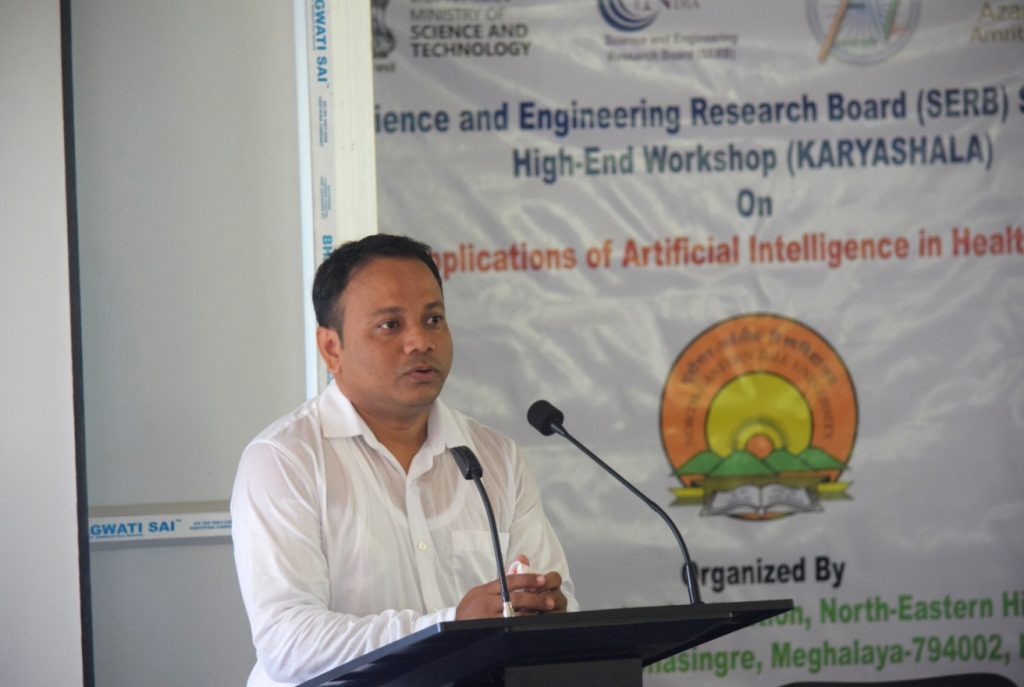Tura, Sept 30: The Department of Computer Application, NEHU, Tura Campus successfully conducted one week long High-End Workshop (KARYASHALA) on “Applications of Artificial Intelligence in Healthcare” sponsored by Science & Engineering Research Board (SERB) of Govt. of India from September 19 to 24, 2022.
The key objectives of this workshop were: to explore the technical opportunities and challenges the Artificial Intelligence (which encompasses the machine learning and deep Learning) offers for developing health sector applications; to showcase the computational algorithms, techniques, and models required to build exciting healthcare applications.

A total of 25 candidates participated in the workshop, coming from different states. Also, 11 speakers (subject experts) shared their valuable knowledge with the participants.
Prof. Samarendra Dandapat (Dept. of Electronics and Electrical Engineering, IIT Guwahati) was the Chief Guest and reflected on the progress of AI in our daily life. He explained how AI can be used in cardiac healthcare and its features and applications. Also, during the open discussion he emphasized on availability of data before embarking on any academic research and to focus on the core subjects.

Then Dr. Jyoti Prakash Medhi (Asst. Professor, Dept. of Electronics of Gauhati University) took a session on “AI in Diabetic Retinopathy.” He spoke about various image processing techniques to detect diabetic retinopathy.
Prof. Sudipta Roy (Professor, Assam University) explained about the introduction to machine learning. Concepts of supervised learning, unsupervised learning, and semi-supervised learning were discussed. Vision 2035 was briefly discussed and suggested research topic such as “Application of blockchain to tackle shortage of doctors in rural areas”.
Using Artificial Intelligence to detect brain diseases like Alzheimer’s, Parkinson’s were explained by Prof. Kandarpa Kumar Sarma (Assistant Professor, Dept. of Electronics of Gauhati University). Deep learning was introduced by him briefly in this session. Dr. Anindya Halder (Associate. Prof., Cotton University, Assam) described the fuzzy and rough set theory for segmenting brain tissues from brain MRI images.

Indigenously developed artificial robotic hands which are still evolving was presented by Prof. Nayan Moni Kakoti (Dept. of Electronics, Tezpur University, Assam). He explained about EMG based prosthetic hands which can change human lives and bring smiles to those who have been living with amputated hands/upper limbs. Uses of colour image segmentation were demonstrated by Dr. Dibyajyoti Borah from Dept. of Information Technology, Kaziranga University, Assam. He mentioned H&E stain was a gold standard in colour image segmentation. Fuzzy C-Means clustering technique was also briefly discussed and he encouraged research scholars to work in fuzzy computing as there are much scope of research works in that area.
Dr. Rubul Kumar Bania (Dept. of Computer Application, NEHU, Tura Campus) explored the topics of transfer learning, explainability in AI. He provided a demonstration on Covid-19 Xray image analysis, detection of face masks using transfer learning and role of social networking during Covid-19 pandemic periods.

Dr.Ansuman Kumar (Assistant Professor, Dept. of Computer Application, NEHU, Tura Campus) delivered talks on Active Learning, Ensemble Learning, Rough Sets, Confusion Matrix, Boxplot and Weka tools. He demonstrated working in Weka using machine learning techniques.
Speech processing for finding speech disorders by using deep learning techniques was discussed by Dr. Sisir Kalita (Senior. Data Scientist, Armsoftech.air, Chennai). Assessment of palette speech intelligibility was also presented by him. Dr. Mohendra Roy (Assistant Professor, Pandit Deendayal Energy University, Gujarat) explained about the patented low-cost microscope device for counting blood cells which he designed during his doctoral studies in Korea University. Also demonstrated how UNet architecture can be used to analyse Brain MRI images. AI explainability models, KM plot, Shapley value, PDP plot and Recursive Elimination Method were also briefly discussed.
During the valedictory program on September 24, Prof. S. C. Subudhi (Professor of Dept. of Education and Deputy Registrar, NEHU, Tura Campus) reiterated the importance of Artificial Intelligence in this contemporary period and congratulated the participants for completing the workshop. In addition, Prof. C.P.Suresh (Dept. of Horticulture, NEHU, Tura Campus) stressed on the ethics in Artificial Intelligence and urged the participants to build AI applications that would transcend humanity and good will.




